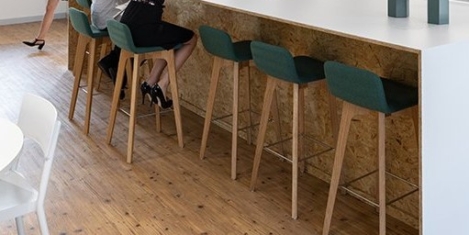To provide the best experiences, we use technologies like cookies to store and/or access device information. Consenting to these technologies will allow us to process data such as browsing behaviour or unique IDs on this site. Not consenting or withdrawing consent, may adversely affect certain features and functions.
The technical storage or access is strictly necessary for the legitimate purpose of enabling the use of a specific service explicitly requested by the subscriber or user, or for the sole purpose of carrying out the transmission of a communication over an electronic communications network.
The technical storage or access is necessary for the legitimate purpose of storing preferences that are not requested by the subscriber or user.
The technical storage or access that is used exclusively for statistical purposes.
The technical storage or access that is used exclusively for anonymous statistical purposes. Without a subpoena, voluntary compliance on the part of your Internet Service Provider, or additional records from a third party, information stored or retrieved for this purpose alone cannot usually be used to identify you.
The technical storage or access is required to create user profiles to send advertising, or to track the user on a website or across several websites for similar marketing purposes.
 However much we know about the forces we expect to come into play in our time and however much we understand the various social, commercial, legislative, cultural and economic parameters we expect to direct them, most predictions of the future tend to come out as refractions or extrapolations of the present. This is a fact tacitly acknowledged by George Orwell’s title for Nineteen Eighty-Four, written in 1948, and is always the pinch of salt we can apply to science fiction and most of the predictions we come across. (more…)
However much we know about the forces we expect to come into play in our time and however much we understand the various social, commercial, legislative, cultural and economic parameters we expect to direct them, most predictions of the future tend to come out as refractions or extrapolations of the present. This is a fact tacitly acknowledged by George Orwell’s title for Nineteen Eighty-Four, written in 1948, and is always the pinch of salt we can apply to science fiction and most of the predictions we come across. (more…)












 Flexible working arrangements are those which ‘allow employees to vary the amount, timing or location of their work’ and may include part-time working, mobile/home working, compressed hours or job-sharing – among others. Before the lockdown, according to the Chartered Institute of Personnel Development (CIPD), more than half of all employees in the UK used at least one form of flexible working, while a study by Gallup in the US suggests as many as 43 percent of employees already worked flexibly. The practice has been found to have positive effects on job satisfaction, employee commitment, reducing work-family conflict – and for many is now an essential component of modern working life.
Flexible working arrangements are those which ‘allow employees to vary the amount, timing or location of their work’ and may include part-time working, mobile/home working, compressed hours or job-sharing – among others. Before the lockdown, according to the Chartered Institute of Personnel Development (CIPD), more than half of all employees in the UK used at least one form of flexible working, while a study by Gallup in the US suggests as many as 43 percent of employees already worked flexibly. The practice has been found to have positive effects on job satisfaction, employee commitment, reducing work-family conflict – and for many is now an essential component of modern working life. 






 Research from
Research from 














July 6, 2020
For the love of procrastination
by Mark Eltringham • Comment, Wellbeing